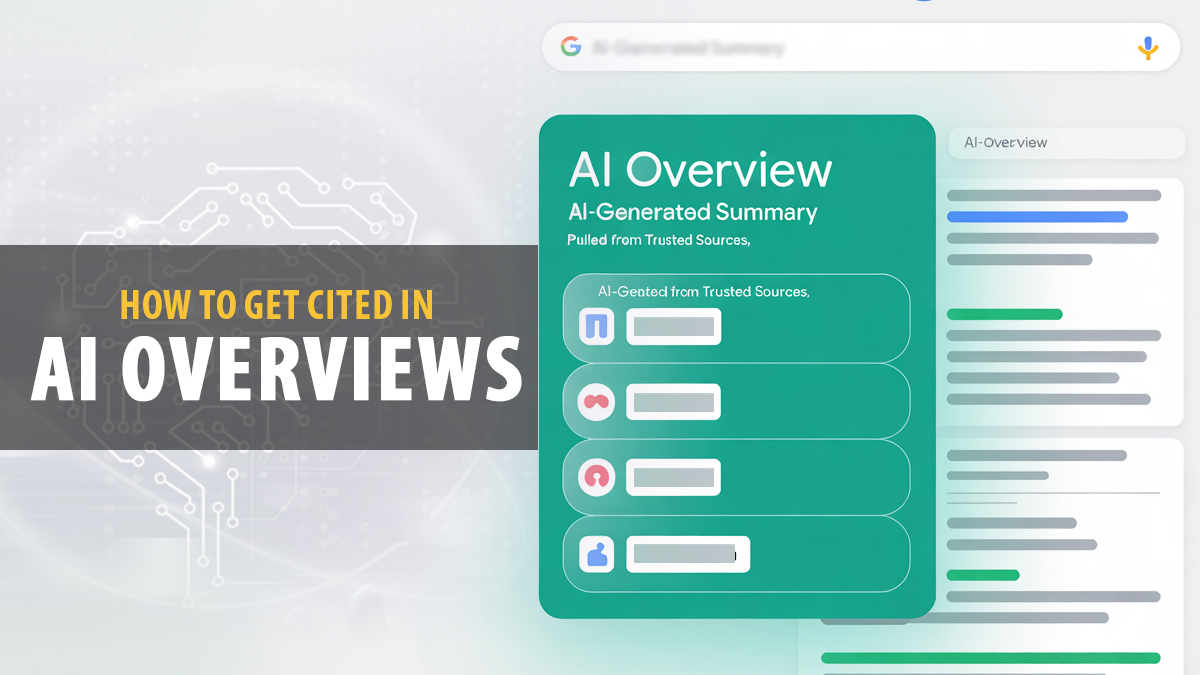As Google evolves, AI Overviews (Search Generative Experience), are changing the way information is shown to users. These AI-made summaries usually show up first in search results, giving short and clear answers taken from different websites.
For content creators, SEO experts, and marketers, being mentioned in these AI Overviews is a great chance to get noticed, build authority, and attract more visitors. Unlike regular search results, AI Overviews use algorithms to choose and combine information, which makes it harder to know where the information comes from.
You should know how to organize your content, show your Experience, Expertise, Authoritativeness, and Trustworthiness (E-E-A-T), optimize keywords, and follow the best technical practices.
This new area of SEO requires us to better understand how Google’s AI chooses sources, judges trustworthiness, and understands content. In this post, we’ll look at practical ways to get cited in AI Overviews.
How AI Citations Help with Online Visibility?
Google is still the most popular option for search, but AI-driven search tools like Perplexity and Claude are becoming more popular quickly. AI tools currently make up a tiny part of the overall market, but they have been growing steadily at a rate of over 10% each year since 2022.
Their quick success is probably why Google started trying out its own AI search tools, like AI Overviews and the new AI Mode. Recent research by Semrush and Statista found that 1 out of every 10 people in the US who use the internet prefer AI search tools when looking for information online.
AI SEO service providers play a crucial role in helping businesses get cited in AI Overviews by optimizing content for relevance, authority, and structured data that aligns with AI-driven search algorithms.
As more people search this way, brands have a big reason to make sure they show up better in AI summaries and overviews. AI citations will help more people find your brand, products, and services.
For example, someone who wants to buy yoga equipment might look it up on Google like this: What are some top brands for yoga equipment? This long phrase leads to an AI summary that suggests some well-known brands.
If you sell yoga mats, having your brand mentioned here would be a big success for your business. You would get a lot of visibility for your brand and build trust. Plus, you could attract lots of visitors and make sales.
Semrush found that people who come from AI search are 4.4 times more likely to take action than those who come from regular search engines. Why is that?
We don’t know for sure yet, but it’s probably because they learned from the AI Overview, which has a lot more information than a usual summary. So, they come to your website knowing more about what they need to buy.
How do AI Tools Get Information and Find Sources?
It’s important to know that AI search tools are not the same as regular search engines. A search engine like Google looks through the internet. This means that Google uses special programs called crawler bots to keep finding and organizing new information on the internet.
This is how Google can show the newest content, even from newer websites. Google’s index is incredibly large because they’ve been doing search for many years. This gives them a big advantage over new companies trying to enter the search market.
A crawler bot checks a website the same way a person does. It clicks on links within the site to discover new content. That’s why having links inside your site is very important for SEO.
When Google searches for information, it looks through its stored data and lists the most useful results. AI search tools like Perplexity, ChatGPT, and Claude do not go through the internet to find information. Instead, they depend on:
- Their training information.
- A special search tool that combines databases and online services to find information that is available to everyone on the internet.
Even though they can’t use Google or Bing directly, they still use their huge collections of information to search the internet. But even though these AI tools use search engine databases, they get their information in very different ways.
For example, AI tools look at things like how many times a brand is mentioned and how often people search for that brand when deciding what to include in their summaries.
Old SEO ranking factors, like using keywords and having backlinks, aren’t as important anymore, but they still do have some significance. Here’s a table that shows the differences:
| Generative AI Citations | Traditional SEO |
| Brand names mentioned in reliable websites | Important search keywords |
| Search volume of brand | Links coming from trustworthy websites |
| Branded anchor text | User behavior signals |
| Structured data | Technical factors |
| Clear source information | Internal links |
Important Signals that Affect AI Citations
Now, let’s find out which signals are most important for making your brand more visible on AI search tools. As we’ve mentioned before, AI search tools consider different things than regular search engines when choosing which sources to use.
Instead of looking for specific words and links, AI tools focus on things like brand names, how trustworthy the author is, and structured data. Here’s a closer look at the key signs for GSO.
Brand Search Volume and Brand Mentions
Research shows that mentions of brands are the most important thing for being included in AI-generated summaries. This study by Ahrefs looked at 75,000 businesses to find out what helped them get noticed more with AI. The three main things that helped the most were:
- Brand web mentions
- Brand anchors
- Brand search volume
You need to make a lot of buzz about your brand to get more attention for your AI. So, brands that want to be included in more AI-created summaries should do digital public relations.
Digital PR helps get your brand featured on reliable news websites and media sources. This helps you get more mentions for your brand. The more your brand is featured in trusted websites, the more likely it is to show up in AI summaries.
It’s important to know that these mentions of your brand don’t need to have links to help your GSO. We suggest you still ask for backlinks because they will help your regular SEO, which is still the main way people find things online.
Structured Data
Structured data, especially schema markup, is a method of “tagging” information so that search engines and AI tools can understand your content better. Schemas are agreed-upon ways to organize data.
They help add meaning and special characteristics to things like: recipes, feedback, and products. For example, by adding the AggregateRating and cookTime details to a recipe, you can show the average 5-star rating and the total time needed to make the recipe right in the Google search results.
These two features won’t show up in Google results unless you use the correct schema markup. Schemas help AI search tools understand your content better, making it easier for them to find what they are looking for. The main plans for AI understanding are:
FAQ Page: Your common questions have some of the best information for AI tools, so don’t ignore this part.
How To: You should get really good at this method if you create many detailed guides and tutorials.
Product: This helps AI tools know what products you sell, which is very important for online stores.
Author: Trust is important for AI, and the Author schema shows who made a specific piece of content. Make sure to add clear information about the authors’ backgrounds, showing their experience and knowledge.
Content Clarity and Topical Authority
This is similar to traditional SEO ranking factors because having knowledge about a topic is important for GSO. Brands gain trust and credibility by thoroughly discussing specific subjects and themes.
Speaking of overlap, research has found that 75% of the links in AI Overviews come from pages that are already in the top 12 search results. This means that good SEO for Google’s AI Overviews can also lead to good GSO. When it comes to clear content, AI tools look for:
- Short sentences and paragraphs.
- A clear organization of the document (like using helpful headings).
- Very few or no mistakes in grammar or spelling.
Check the Ratings and Reviews
AI search tools will look at your brand’s reviews to make sure you’re reliable enough to be included in summaries and overviews. To get noticed by AI tools, you need a great review profile. This also helps with regular SEO.
Also Read: How to Rank in ChatGPT: SEO Strategies That Actually Work
How to Improve Your Content to Get Cited in AI Overviews?
Next, let’s use what we have learned to create a good AI SEO plan. Here are some easy ways to make your content show up more in AI overviews.
Create Brand Mentions Using Online PR
Building on what we talked about earlier regarding digital PR, here are some good ways to get your brand mentioned:
- Connecting with online reporters, bloggers, and news organizations.
- Reaching out using sites like HARO
- Making new research and expert content to get people talking.
Add Relevant Headings, FAQs, and Summary Boxes
Make your content short and clear so that it works well with AI tools. That means using subheadings correctly. You should only use one H1 tag, and then use H2, H3, and H4 tags after that.
Also, use summary boxes and call-out boxes to grab the attention of AI. Put important information in these boxes. The same rule works for your FAQ sections, so make sure to provide clear and short answers that contain important words.
Check Your Review Profile
You should keep an eye on your reviews and take care of them, not just the ones on Google. AI tools will look at places besides Google for reviews about your business. So, you should also keep an eye on reviews on sites like:
- CNET
- Yelp
- Amazon Verified Reviews
- Better Business Bureau
- Tripadvisor
Getting a bad review sometimes isn’t a big deal, and you shouldn’t remove them. As long as you reply and try hard to fix the problem, people will still see you positively.
Also read: 33 ChatGPT Alternatives Worth Trying in 2025 (Both Free and Paid Options)
9 Tools to Get Cited in AI Overviews
For Tracking Brand Mentions
Brand24
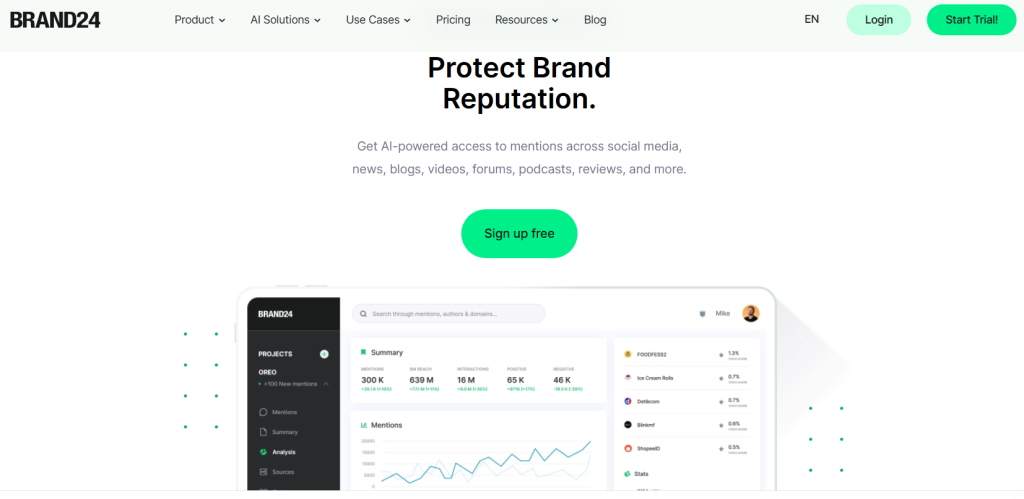
Brand24 is a strong tool that allows businesses to see when people mention their brand on social media, news websites, blogs, forums, and other places. It gives instant updates and helps understand how people feel, allowing businesses to quickly react to good and bad comments.
With its easy-to-use interface, users can see popular topics, track how many people are talking about them, and find key people discussing the brand. It provides charts and past data, which helps you see how marketing campaigns are doing over time.
The tool helps teams work together by letting them share access and create personalized reports. Whether you’re watching a product launch or checking how your brand is doing, it provides useful information to help you maintain a good reputation and make better communication plans.
Mention
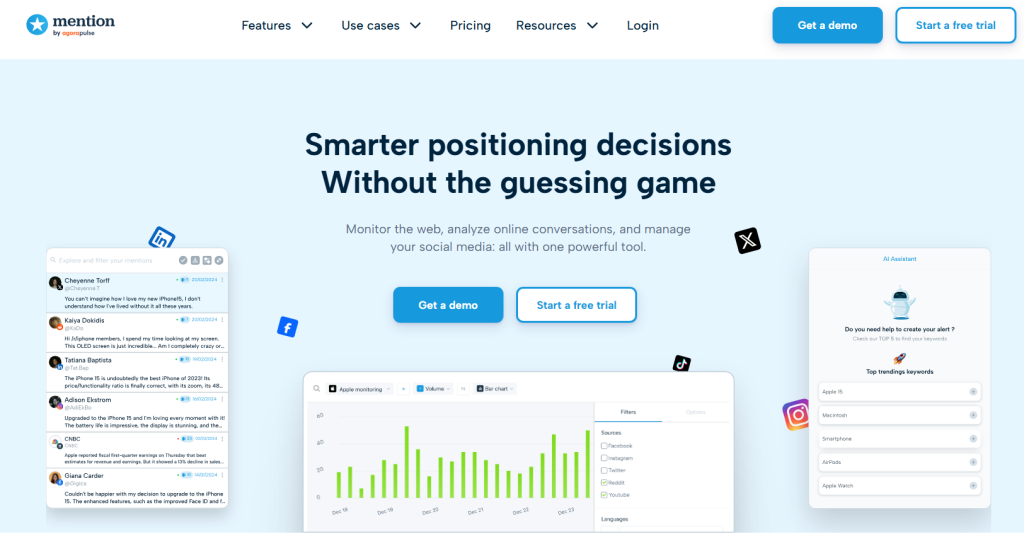
Mention is a tool that helps brands see what people are saying about them online. It tracks discussions on websites, blogs, forums, and social media. Made for PR workers, marketers, and social media managers, Mention helps users create custom alerts to watch for specific words, like brand names, competitor names, and industry terms.
Its easy-to-use design gives real-time updates and analyzes emotions, helping brands quickly reply to good and bad comments. Users can sort alerts by how important they are and give tasks to team members right inside the platform.
Mention provides tools to report and analyze online discussions. These tools help track how many people see and interact with conversations, giving information about how well a brand is seen and its reputation over time.
It also helps businesses keep track of what people are saying online. It allows them to quickly notice and respond to changes in how the public feels, making it an important tool for their online plans.
Google Alerts

Google Alerts helps you keep track of when your brand or specific words are mentioned online. Users just type in a word or phrase, like a company name, product, or competitor, and Google will email them updates whenever new information about that term becomes available.
Google Alerts is easy to use and good for simple brand tracking, even though it doesn’t provide instant updates or feelings analysis. It’s great for people or small businesses looking for an easy way to keep track of their online presence.
You can change alerts to fit your needs by choosing how often you get them, in what language, where they are from, and what kind of content you want, like news or blogs. It may not have as many features as expensive tools, but it can still be useful as part of a larger plan when used alongside more advanced tools.
For Reputation Management
Sprout Social
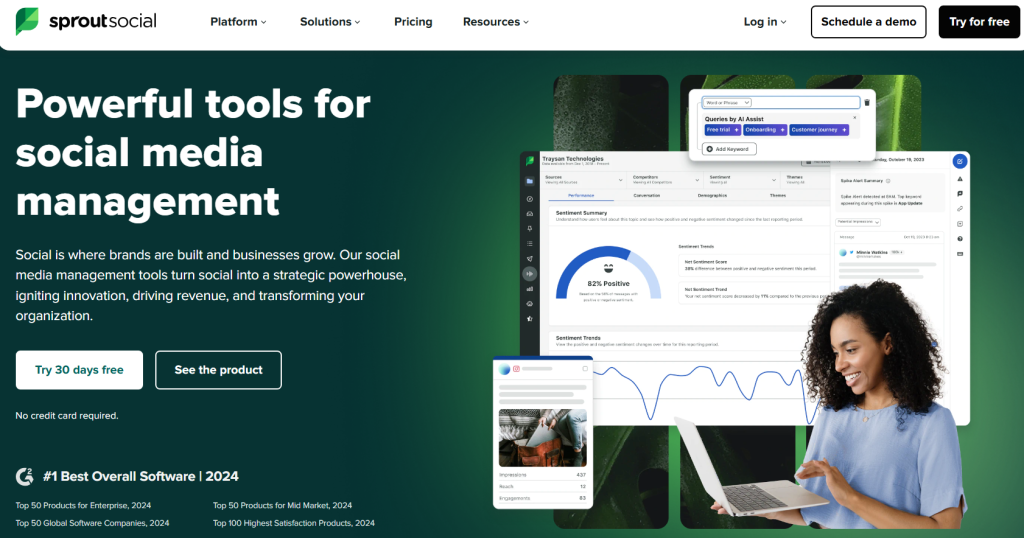
This is a complete tool for managing social media that has strong features for managing your reputation. It helps businesses keep an eye on what people say about their brand, reply to customer comments right away, and see how people feel about them on platforms like Facebook, X, Instagram, LinkedIn, and others.
The tool has a Smart Inbox that collects all your messages in one place, making it easier to see and reply to them quickly. With its smart tools, users can see how their efforts are working and spot common problems or positive feedback.
It helps you keep track of problems and compare your brand to competitors to keep your brand looking good. Its tools for teamwork make it great for big social media teams, helping them share a consistent message.
The platform’s ability to listen to social media helps brands understand how people view them. This gives brands the tools they need to take care of their reputation and create better connections with their audience.
Reputology

Reputology is a tool that helps businesses keep track of and manage customer reviews from sites like Yelp, Google, Facebook, and TripAdvisor. It collects reviews right away, which helps businesses, especially in retail, hospitality, and healthcare, take care of how people see them online.
Reputology helps businesses understand what people think about them, keep track of trends, and send automatic alerts. This way, businesses can quickly deal with bad reviews before they hurt their reputation.
The tool sorts reviews by topic, helping you understand repeated problems better. It helps big companies and franchises keep their brand consistent at all their locations by offering customizable dashboards and tools to manage multiple places.
Connecting with platforms like Hootsuite makes it easier to manage social media responses. It helps businesses use customer feedback to make smart decisions and create stronger trust with their customers.
Hootsuite Insights
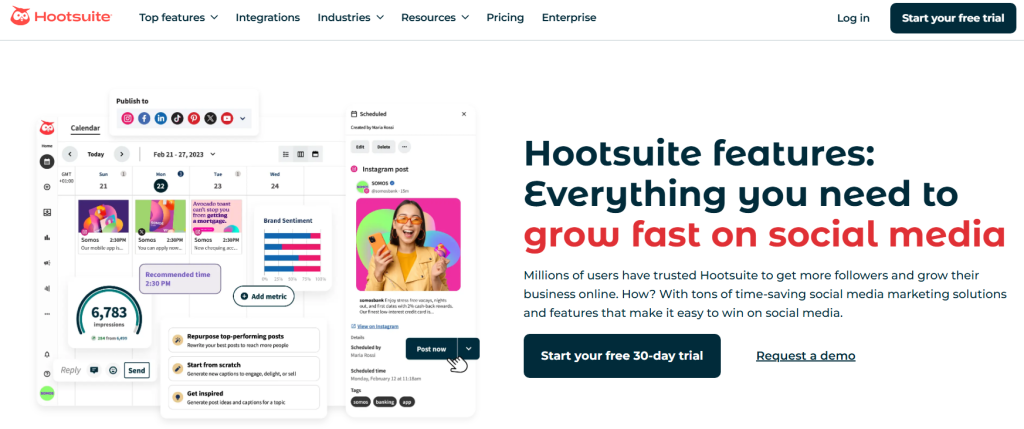
Hootsuite Insights, powered by Brandwatch, is a tool for businesses that helps them monitor what people are saying about them online. It gives detailed reports and tracks information in real-time to help manage their reputation.
It does more than just keep track of mentions; it also analyzes emotions, shows who is talking about things, and identifies trends on social media, blogs, forums, and news sites. Using AI tools, businesses can spot potential problems, keep track of how their campaigns are doing, and check the overall strength of their brand.
The tool allows users to sort conversations by where they are happening, the language used, and how influential people are. This helps companies pay attention to the most important discussions.
Hootsuite Insights works easily with the rest of Hootsuite, allowing users to watch, interact, and post all from one main screen. This tool helps organizations that have many brands or operate in different markets to grow and tailor their needs.
For Monitoring Google AI Overviews
Ahrefs
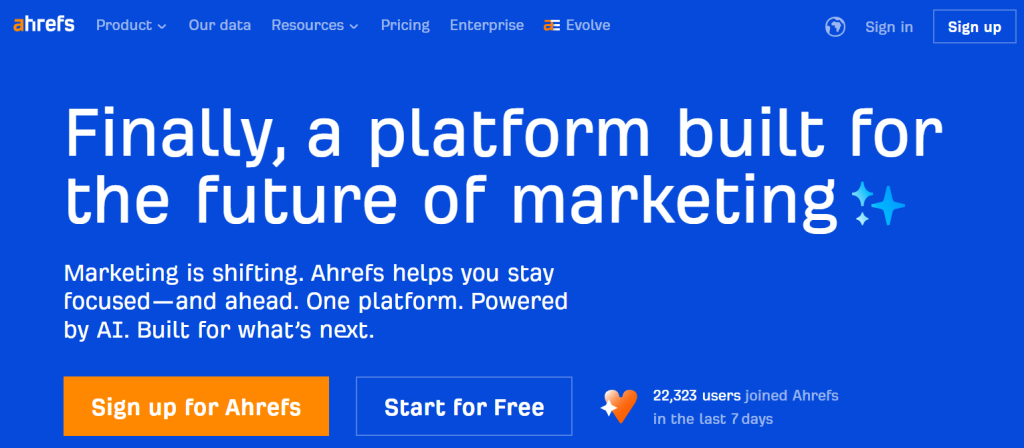
Ahrefs is a top SEO tool that recently added new features to help users keep track of Google’s AI Overviews, which used to be called Search Generative Experience. It can now track keywords and analyze search results to see when AI Overviews appear for certain searches.
Users can check how often their content shows up in AI Overviews and see which competitors are included. This visibility helps content creators change their SEO strategy to improve their chances of being included in these changing results.
Ahrefs has a large collection of backlinks and content, which helps to show how rankings relate to appearances of AI Overviews. Businesses gain from knowing how traffic changes when AI Overviews take the place of regular blue-link listings.
Ahrefs is still an important tool for SEO experts, especially as Google’s search features change. It regularly updates its tools and stays honest about what it does. This helps marketers see how changes made by AI affect their visibility and plans.
Advanced Web Ranking

Advanced Web Ranking has created a special tool called Google AI Overview to help SEO experts keep track of how AI-generated answers affect how well websites show up in search results.
This tool checks if AI Overviews show up for certain keywords and gives detailed reports on how often they appear, what they say, and the websites they link to. Users can break down data by the type of device, where people are located, and what they are looking for.
This gives a detailed look at how Google’s changing AI results influence rankings. AWR’s tool helps find chances and risks in search results driven by AI. This lets marketers improve their content to fit with the way AI summarizes information.
Looking at past data helps users see how things have improved over time, and comparing with competitors helps improve their strategies. It gives a complete view of how changes in Google’s AI affect how visible websites are online.
Keyword.com
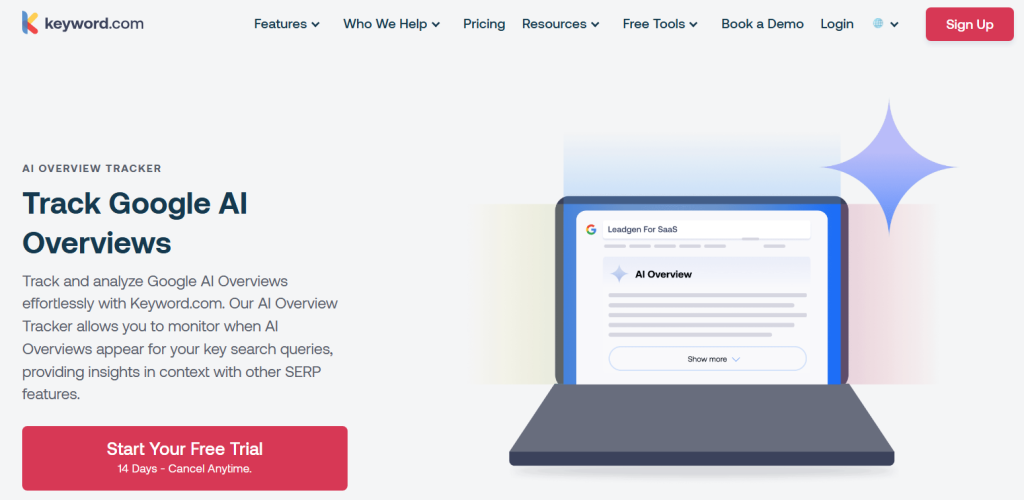
Keyword.com’s AI Overview Tracker is a new tool designed to help marketers and SEO experts see how Google’s AI Overviews affect search visibility. This tool checks if AI-made content shows up for a list of keywords and finds out which websites are mentioned in those results.
Users can easily check if their website is listed, see which competitors are getting noticed, and find out how often AI Overviews appear. The tracker shows your location, rates how easy it is to find you, and keeps a record of changes.
This helps users quickly react to changes in how people search. Simple dashboards and automatic reports make it easy for teams, no matter how big or small. It’s a helpful tool for SEO experts who want to boost their visibility in today’s AI-driven world.
Ultimately, Keyword.com helps businesses understand how AI is changing search results, allowing them to improve their strategies for marketing and stay competitive in the digital world.
To Conclude
As AI summaries are showing up more often in Google search results, getting featured in them is becoming very important for today’s SEO strategies. Although it’s not completely clear how Google decides what to show in AI-generated answers, we are starting to see some trends.
Focusing on creating clear, reliable, and well-organized content that shows expertise can greatly increase the likelihood of being cited by others. It’s important to keep up with changes in Google’s AI algorithms, what users want, and how people search.
Tools like Ahrefs, Keyword.com’s AI Overview Tracker, and Advanced Web Ranking can help you check how well your website is doing and plan your content. In the end, being mentioned in AI Overviews isn’t just about having a high ranking, it’s about being seen as a trustworthy and helpful source by both Google’s AI and its users.
FAQs
What sort of information can you expect to find in AI Overviews?
Content that is true, organized, and clearly answers questions is most likely to be mentioned by others. Google’s AI prefers content that shows Experience, Expertise, Authority, and Trustworthiness (E-E-A-T). Organized content like how-to guides, question-and-answer sections, lists, and clearly written paragraphs that answer questions are very helpful. Content that has good sources and references is usually seen as more reliable by AI systems.
Does domain authority of a site affect its chances of being included in AI summaries?
Yes, domain authority (which shows how trusted and reliable your website is) is an important factor that can greatly affect if your content gets picked up. Websites that have many good backlinks, quality content, and follow SEO rules are seen as more trustworthy by Google’s AI. However, new or specialized websites can still be used as sources if they provide good, relevant, and expert information.
Can tools help us monitor AI Overview performance and usage?
Yes, many SEO tools can now help you check if your content shows up in AI Overviews. Tools like Ahrefs, Keyword.com’s AI Overview tracker, and Advanced Web Ranking’s AI Overview tool let you check which keywords activate AI Overviews and if your site is mentioned. These ideas can help you change your content plan, find missing parts, and see how you are doing compared to your competitors in this changing area.
Are there chances of losing visitors because of AI summaries?
Yes, sometimes. Since AI Overviews give answers right on the search page, people might not visit the website where the information comes from. Even if people don’t click on it, being mentioned can still help gain respect and get noticed. As time goes on, that trust can lead to more users knowing about your brand, more links to it, and more interaction with it in other places.
How often does Google refresh its AI Overview results?
Google’s AI Overviews can change often. They update based on how good the content is, what people are searching for, or any changes to the algorithms. This means your content could be used one week and then updated the next. Keeping your content updated, following the latest SEO tips, and checking your site’s performance with SEO tools can help you stay visible online.
